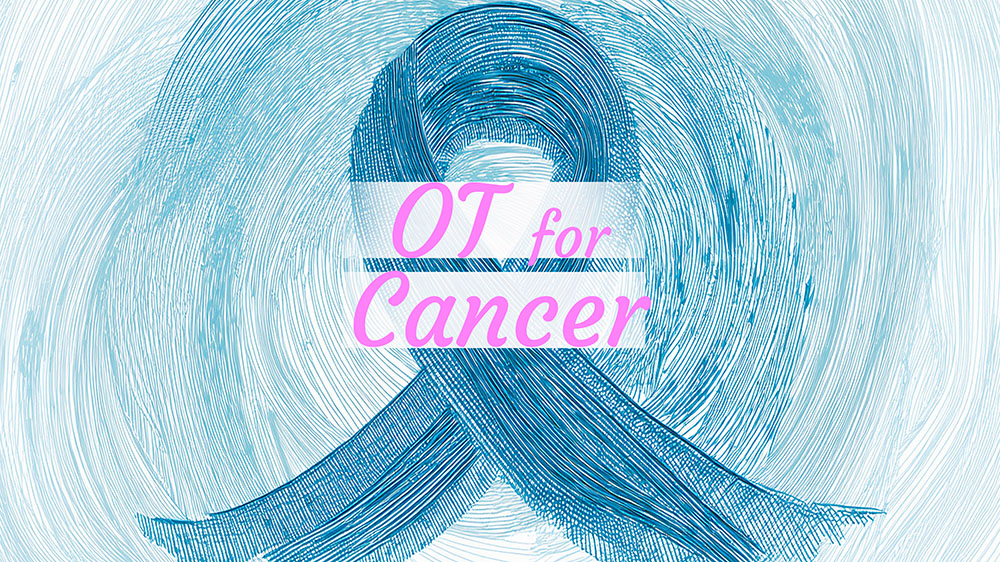If you’re seeking cancer rehab (especially occupational therapy), we want you to be as informed as possible so we can truly partner to create the best course of treatment for YOU.
In occupational therapy, we tend to work from “menus” of evidence-based assessments and treatments. This gives us the flexibility to meet the specific needs of each patient. Below, you’ll see the assessment and treatment options your therapist may use, along with the evidence that supports them.

Please note that this page is for educational purposes and should not substitute advice from your medical provider. At the bottom of this page, you’ll find therapists near you who can support you in your cancer rehab.
A quick note on why to pursue cancer rehab
Cancer rehabilitation—including occupational therapy—can help improve your quality of life as you undergo cancer treatment. Cancer rehabilitation professionals can support everything from cancer prevention and health promotion following diagnosis to management of independence during and after cancer treatment. For example, cancer rehabilitation professionals are skilled in addressing many of the 10 recommendations for cancer prevention from the American Institute for Cancer Research.
Cancer rehab professionals can help with areas such as: quality of life, activities of daily living, fatigue, functional mobility, exercise, cognition, communication, sexual function, caregiving, and return to work. In addition to improving your overall quality of life, cancer rehabilitation services aim to:
- decrease your risk of needing more intensive services, and
- help you overcome severe side effects later in the cancer journey.
To date, outpatient oncology rehabilitation services have been linked to significantly lower costs associated with emergency department visits, home health services, skilled nursing facility stays, and hospice care.
Therapist-recommended assessments for cancer rehab in adults and older adults
As you can see below, a cancer rehab evaluation can focus on multiple areas.
In addition to informing treatment at the beginning of your therapy journey, assessments provide a point of comparison to track your progress and response to treatment over time. (Without an accurate and thorough baseline, it can be hard to tell how much the interventions are helping!) As such, your therapist may perform certain assessments at various intervals over the course of therapy.
Occupation-Focused
- Canadian Occupational Performance Measure1,2
- Activity Card Sort – modified3
- PROMIS® Bank v2.0 – Satisfaction with Social Roles and Activities3
- PROMIS® Bank v2.0 – Ability to Participate in Social Roles and Activities3
- Late-Life Function & Disability Instrument4
- Possibilities for Activity Scale5,6
Quality of Life and Global Health
- Functional Assessment of Cancer Therapy – General (FACT-G)7
- Medical Outcomes Study Short-Form (SF-36)8
- European Organisation for Research and Treatment Quality of Life (EORTC QLQC-30)9
- PROMIS® Global Health (Physical and Mental Health Subscales)10
Cancer-Related Cognitive Impairment
- Functional Assessment of Cancer Therapy Cognition (FACT-Cog)1
- Blessed-Orientation Memory Concentration Test11
- Mini-Cog12
Physical Dysfunction
- PROMIS® Physical Function Cancer3
- Six Minute Walk Test13
- Short Physical Performance Battery14
- Disabilities of the Arm, Shoulder, and Hand Questionnaire15
- Timed “Up and Go”16
- Physical Activity Scale for the Elderly17
Cancer-Related Fatigue
- Functional Assessment of Chronic Illness Therapy – Fatigue18
- The Pittsburgh Sleep Quality Index (PSQI)19
Mood
- PHQ-914
- Hospital Anxiety and Depression Scale14
- Geriatric Depression Scale14
Social Support
- Medical Outcomes Survey Social Support14
Distress
- NCCN Distress Thermometer20
Setting goals for cancer rehab
Therapy only works best when there is buy-in from the patient. It is important that you work with your therapist to set treatment goals that truly reflect what’s important to you.
Therapy treatment interventions for cancer rehab
After a thorough evaluation and goal-setting process, it is time to start making progress. Below are treatment interventions that can be implemented as part of a holistic therapy program.
Possible treatment interventions21–23
Evidence-Based, Occupationally-Driven Intervention Approaches
- Behavioral Activation4,24,25
- Lifestyle Redesign Protocol26,27
General OT Approaches That Address Cancer-Related Physical or Sensory Changes (e.g., debility, chemotherapy-induced peripheral neuropathy, cancer-related fatigue, etc.)
- Therapeutic Exercise
- Energy Conservation and Work Simplification Strategies
- Ergonomic Evaluation of Home and Work Space
- Education and Training on Assistive Technology/Adaptive Equipment
- Task/Activity Analysis
- Physical Agent Modalities
- Balance and Falls Reduction Training
- Joint Protection Techniques
- Tactile Perception and Proprioceptive Exercises
General OT Approaches That Address Cancer-Related Cognitive Impairment and Fatigue
- Routine-Based Strategies
- Environmental Strategies
- Energy Conservation Strategies
- Social Support
Choosing a therapist for cancer rehab
When searching for an occupational therapy professional to provide treatment for cancer, you may want to look for someone with multiple focus areas relevant to your condition (e.g., “lymphedema,” “cancer rehab,” or “insomnia.” )
Below, you can find OT professionals who have tagged cancer rehab as a focus area.
Conclusion
Hopefully, this article has helped you understand what therapy for cancer rehab entails, and whether you are a good candidate!
This article is updated regularly based on new research. If you have any research you would like us to consider for our next update, please drop it in the comments!
Therapists who would like more fleshed-out information on cancer rehab treatment can join us as members of the OT Potential Club.
Article by
Rachelle Brick, PhD, MSPH, OTR/L, is an OT specializing in cancer rehabilitation. In addition to caring for cancer survivors across the cancer care continuum, Dr. Brick conducts research on access and delivery of cancer rehabilitation services and interventions for older cancer survivors.

Reviewed by
Sarah Lyon, OTR/L, is the CEO of OT Potential and is on a mission to bridge the gap between research and real occupational therapy practice.
Edited by
Brooke Andrus is the Head of Content at OT Potential, bringing over a decade of experience strategizing, building, and executing on content marketing plans for successful healthcare tech startups in the rehab therapy and behavioral health spaces.
References
Here’s the science backing the assessments and treatment outlined above.
- Newman R, Lyons KD, Coster WJ, Wong J, Festa K, Ko NY. Feasibility, acceptability and potential effectiveness of an occupation-focused cognitive self-management program for breast cancer survivors. Br J Occup Ther. 2019.
- Sleight AG, Roberts PS, Lyons K, Amaral L, Feldman AE. An OT Health Self-Management Program for Cancer Survivors Improves Health Behavior Occupational Performance Scores: A Pilot Study. Am J Occup Ther. 2024.
- Brick R, Bender C, Skidmore E. Impact of cancer and cancer-related treatments on participation restrictions. Br J Occup Ther. 2021.
- Lyons KD, Bruce ML, Hull JG, et al. Health Through Activity: Initial Evaluation of an In-Home Intervention for Older Adults With Cancer. Am J Occup Ther Off Publ Am Occup Ther Assoc. 2019.
- Pergolotti M, Cutchin MP, Muss HB. Predicting participation in meaningful activity for older adults with cancer. Qual Life Res Int J Qual Life Asp Treat Care Rehabil. 2015.
- Pergolotti M, Deal AM, Williams GR, et al. Older Adults with Cancer: A Randomized Controlled Trial of Occupational and Physical Therapy. J Am Geriatr Soc. 2019.
- Romero-Ayuso D, García-López R, Lozano-Villena C, et al. Usability of a mobile phone application to enhance activities of daily living in occupational therapy services for breast cancer survivors. Hong Kong J Occup Ther HKJOT. 2023.
- Harrington SE, Stout NL, Hile E, et al. Cancer Rehabilitation Publications (2008-2018) With a Focus on Physical Function: A Scoping Review. Phys Ther. 2020.
- Riedl D, Giesinger JM, Wintner LM, et al. Improvement of quality of life and psychological distress after inpatient cancer rehabilitation. Wien Klin Wochenschr. 2017.
- Pergolotti M, Covington KR, Lightner AN, et al. Association of Outpatient Cancer Rehabilitation With Patient-Reported Outcomes and Performance-Based Measures of Function. Rehabil Oncol. 2021.
- Magnuson A, Ahles T, Chen BT, Mandelblatt J, Janelsins MC. Cognitive Function in Older Adults With Cancer: Assessment, Management, and Research Opportunities. J Clin Oncol Off J Am Soc Clin Oncol. 2021.
- Pergolotti M, Battisti NML, Padgett L, et al. Embracing the complexity: Older adults with cancer-related cognitive decline-A Young International Society of Geriatric Oncology position paper. J Geriatr Oncol. 2020.
- Leach HJ, Covington KR, Pergolotti M, et al. Translating Research to Practice Using a Team-Based Approach to Cancer Rehabilitation: A Physical Therapy and Exercise-Based Cancer Rehabilitation Program Reduces Fatigue and Improves Aerobic Capacity. Rehabil Oncol. 2018.
- Brick R, Jensen-Battaglia M, Streck BP, et al. Exploring geriatric assessment-driven rehabilitation referral patterns and its influence on functional outcomes and survival in older adults with advanced cancer. J Am Geriatr Soc. 2025.
- Abdur Rahman Md, Rashid MdM, Le Kernec J, et al. A Secure Occupational Therapy Framework for Monitoring Cancer Patients’ Quality of Life. Sensors. 2019.
- Huang MH, Hile E, Croarkin E, et al. Academy of Oncologic Physical Therapy EDGE Task Force: A Systematic Review of Measures of Balance in Adult Cancer Survivors. Rehabil Oncol. 2019.
- Fitzpatrick TR, Farone DW. Leisure, household activities, and health among Mexican American elders with cancer. J Psychosoc Oncol. 2011.
- Fleischer A, Fisher M, Scheid D, et al. Interdisciplinary Cancer Rehabilitation eHealth Impact on Quality of Life. Arch Phys Med Rehabil. 2024.
- Chen HM, Lin YY, Wu YC, et al. Effects of Rehabilitation Program on Quality of Life, Sleep, Rest-Activity Rhythms, Anxiety, and Depression of Patients With Esophageal Cancer: A Pilot Randomized Controlled Trial. Cancer Nurs. 2022.
- Bulli F, Miccinesi G, Maruelli A, Katz M, Paci E. The measure of psychological distress in cancer patients: the use of Distress Thermometer in the Oncological Rehabilitation Center of Florence. Support Care Cancer Off J Multinatl Assoc Support Care Cancer. 2009.
- Hunter EG, Gibson RW, Arbesman M, D’Amico M. Systematic Review of Occupational Therapy and Adult Cancer Rehabilitation: Part 1. Impact of Physical Activity and Symptom Management Interventions. Am J Occup Ther Off Publ Am Occup Ther Assoc. 2017.
- Hunter EG, Gibson RW, Arbesman M, D’Amico M. Systematic Review of Occupational Therapy and Adult Cancer Rehabilitation: Part 2. Impact of Multidisciplinary Rehabilitation and Psychosocial, Sexuality, and Return-to-Work Interventions. Am J Occup Ther Off Publ Am Occup Ther Assoc. 2017.
- He K, Jiang J, Chen M, et al. Effects of occupational therapy on quality of life in breast cancer patients: A systematic review and meta-analysis. Medicine (Baltimore). 2023.
- Brick R, Lyons KD, Rodakowski J, Skidmore E. A Need to Activate Lasting Engagement. Am J Occup Ther. 2020.
- Lyons KD, Wechsler SB, Ejem DB, et al. Telephone-Based Rehabilitation Intervention to Optimize Activity Participation After Breast Cancer: A Randomized Clinical Trial. JAMA Netw Open. 2024.
- Leske M, Koczwara B, Blunt J, et al. Co-designing Healthy Living after Cancer Online: an online nutrition, physical activity, and psychosocial intervention for post-treatment cancer survivors. J Cancer Surviv Res Pract. 2024.
- Pyatak EA, Carandang K, Rice Collins C, Carlson M. Optimizing Occupations, Habits, and Routines for Health and Well-Being With Lifestyle Redesign®: A Synthesis and Scoping Review. Am J Occup Ther Off Publ Am Occup Ther Assoc. 2022.
Additional Resources
Maltser S, Cristian A, Silver JK, Morris GS, Stout NL. A Focused Review of Safety Considerations in Cancer Rehabilitation. PM R. 2017.
OT Potential does not endorse any treatments, procedures, products, or therapists referenced herein. This information is provided as an educational service and is not intended to serve as medical advice. Anyone seeking medical advice should consult their medical provider.


